To use a VPN on mobile, you can either install a VPN app (the fastest and most user-friendly option) or set one up manually through your phone’s settings. Android and iPhone also include limited built-in options, such as iCloud Private Relay on iOS or Google’s VPN on Pixel devices. Most people choose a VPN app for one-tap access to secure servers and built-in features, like a kill switch or leak protection. Manual setup is typically more difficult and usually only used for workplace VPNs or when an app isn’t available.
We’ll walk you through both setup methods step-by-step on Android and iPhone. You’ll also learn how to fix common issues, use a VPN with a hotspot, and check if your VPN is working properly.
How to Set Up and Use a VPN App on Mobile
The easiest way to use a VPN on mobile is with a dedicated app. Both Android and iOS support native apps, so you can install one from the official app store and connect within seconds.
Here’s how to set it up on both platforms, using CyberGhost VPN as an example.
Android
- Subscribe to CyberGhost VPN. It supports the fastest and most secure VPN protocols, including IKEv2 (designed for seamless mobile connections), top-of-the-range encryption, and a fail-proof kill switch to really protect your data.
- Install the CyberGhost VPN app from our Android download page or the Google Play Store.
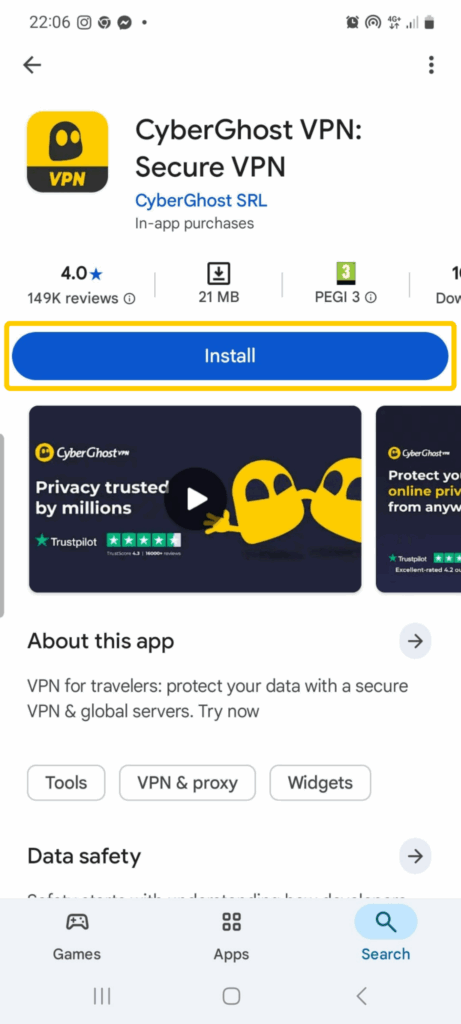
- Open the app and tap Agree & continue to accept CyberGhost VPN’s privacy policy.
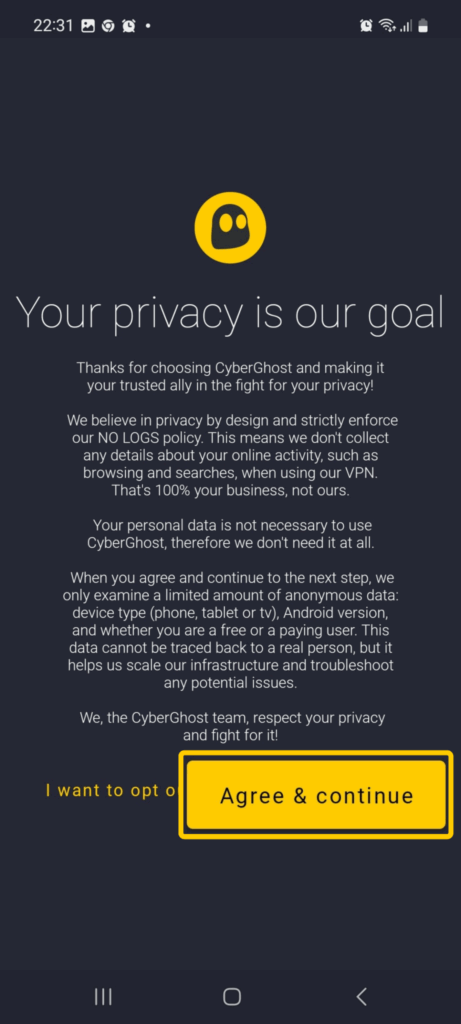
- Tap Existing User? to log in using your new credentials from Step 1. If you haven’t subscribed yet, you can do so now by tapping Subscribe now.
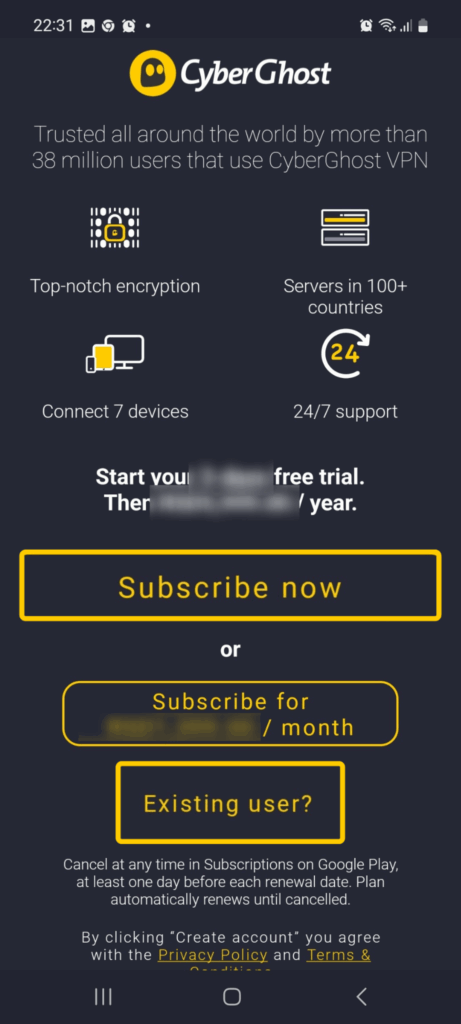
- Add a VPN configuration on your phone by tapping OK. Android will show a connection request message explaining that the VPN can manage your network traffic. Click OK again to proceed.
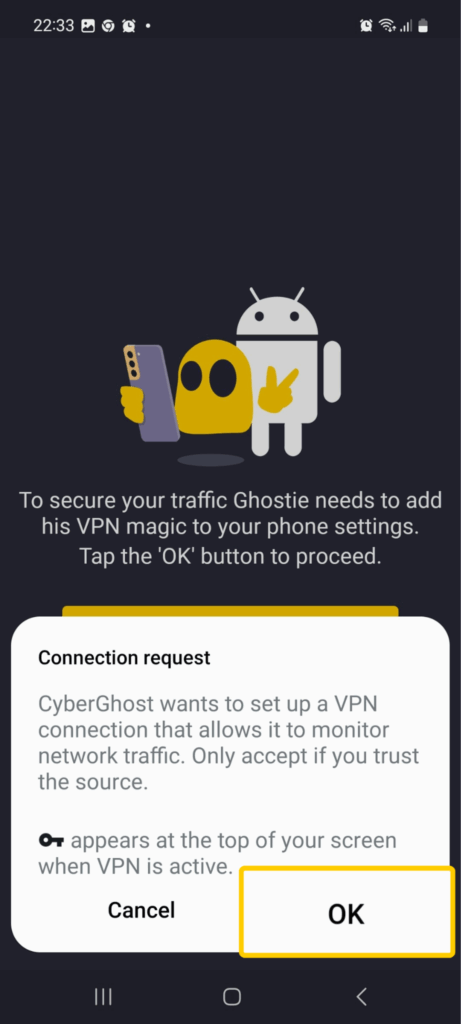
- Tap the large power button to connect. The app can select the fastest server for you (Best Location), or you can choose a specific location yourself using the list of available servers.
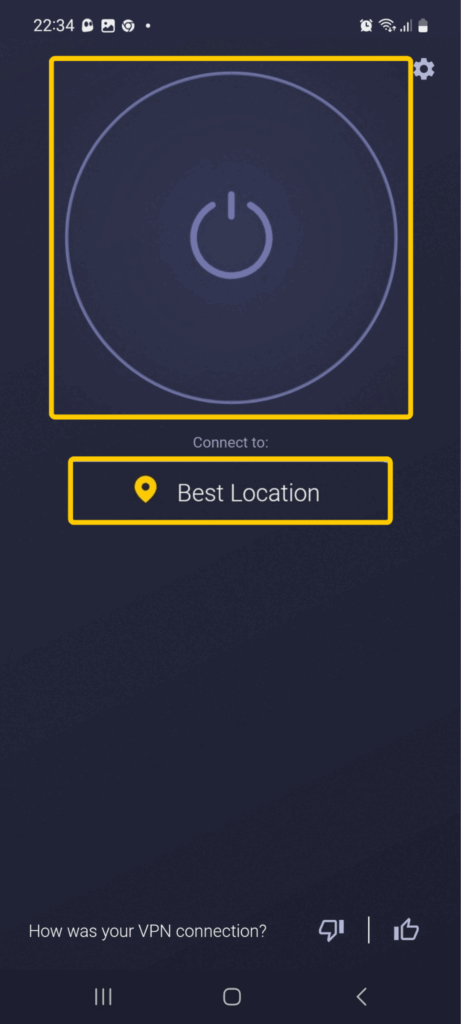
- To switch servers or locations, tap the power button to disconnect. Then, press Best Location. Under the Countries tab, choose a specific country to connect to.
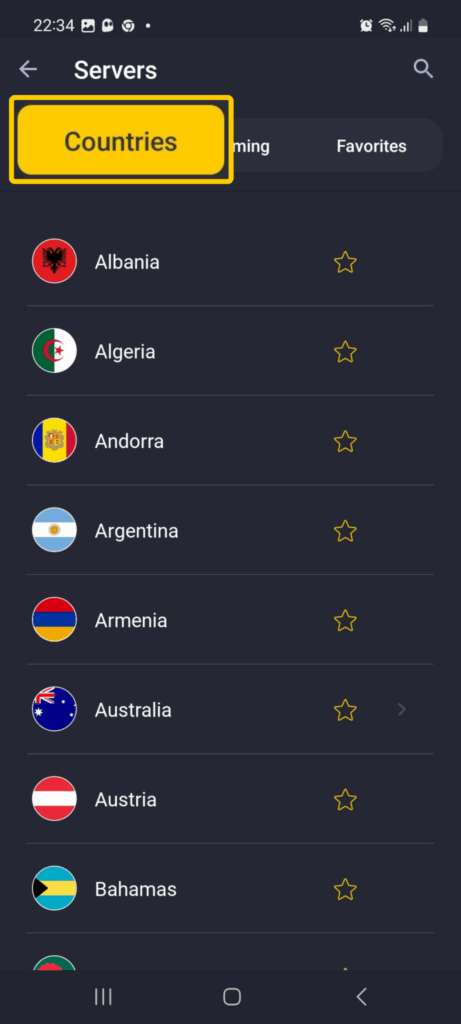
- After you select a server, the app reconnects and then displays the updated server location and IP address on the main screen.
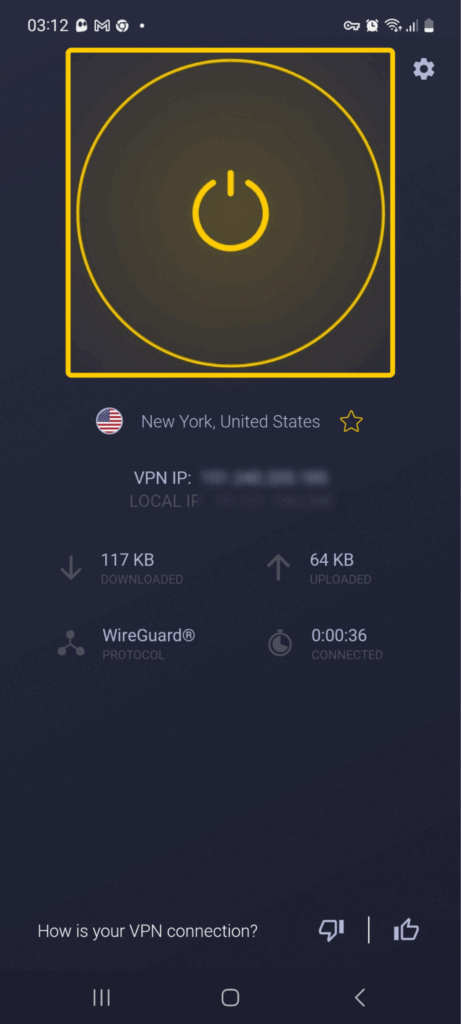
iOS
- Subscribe to CyberGhost VPN. With a native app for iOS and best-in-class security features, including 256-bit AES encryption, an automatic kill switch, and leak protection, it’s a top VPN for mobile devices.
- Download and install the VPN app from our iOS download page or the App Store.
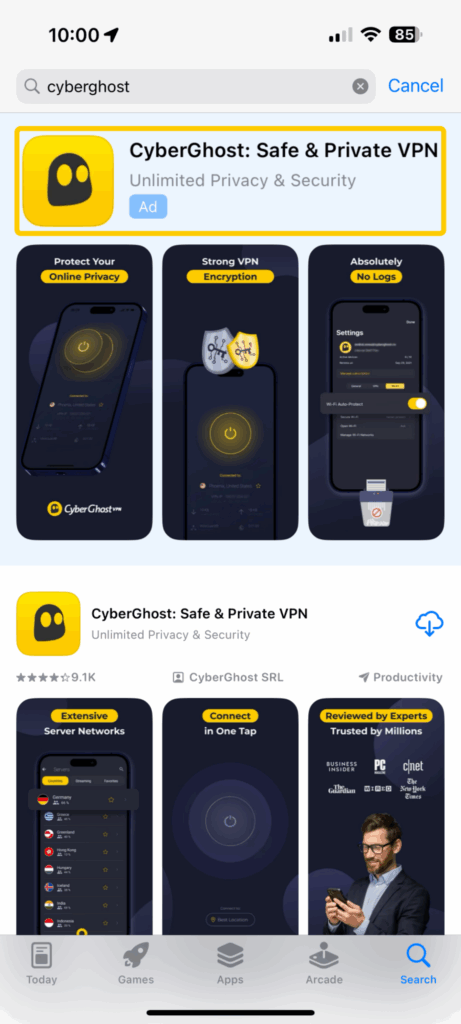
- Open the app and tap Agree & continue to accept CyberGhost VPN’s privacy policy.
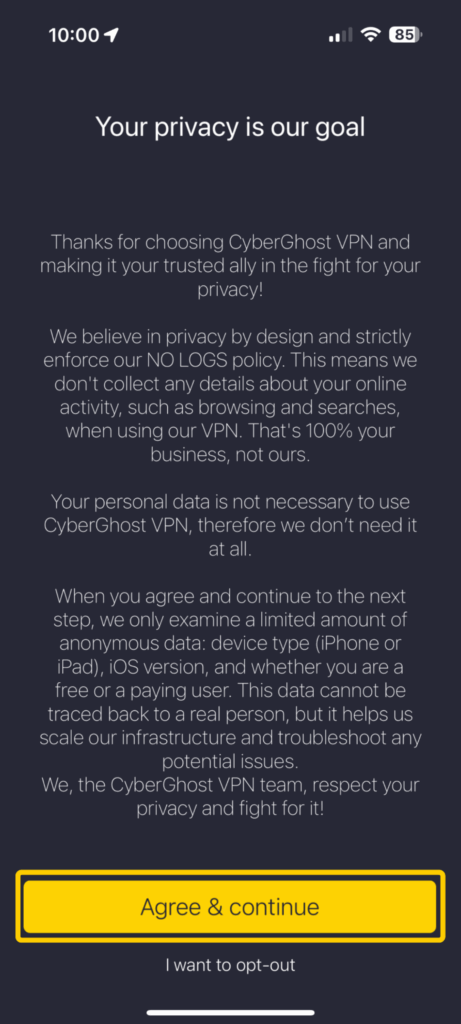
- Tap I already have an account and log in, or select Subscribe now if you still need to create your account.
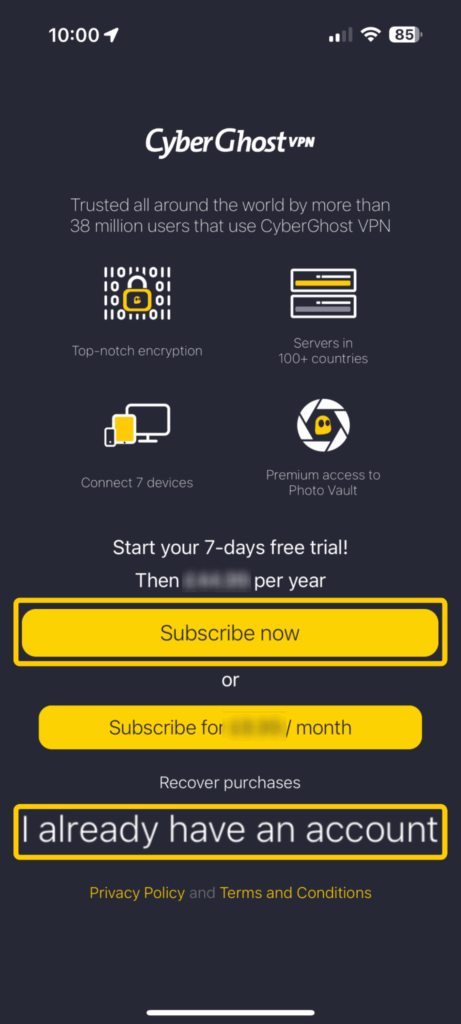
- When prompted, allow notifications from CyberGhost VPN.
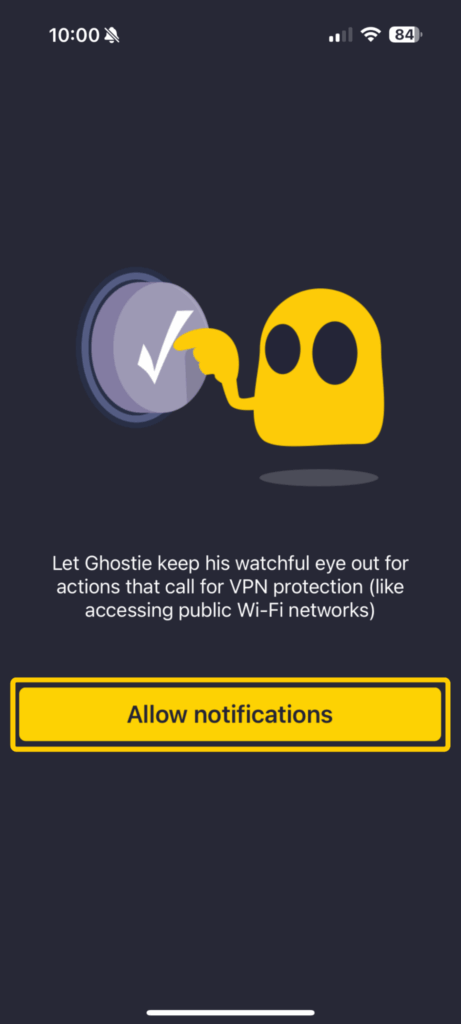
- Add a VPN configuration on your iPhone by tapping OK, then Allow. This lets CyberGhost VPN manage your internet connection.
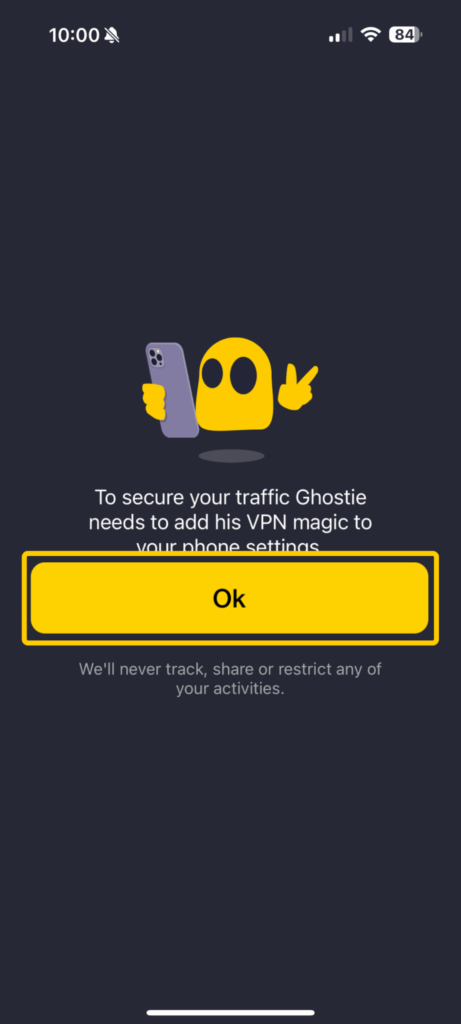
- To connect, click on the large power button on the main screen. CyberGhost VPN can select the best location for you, or you can choose a specific location yourself from the server list.
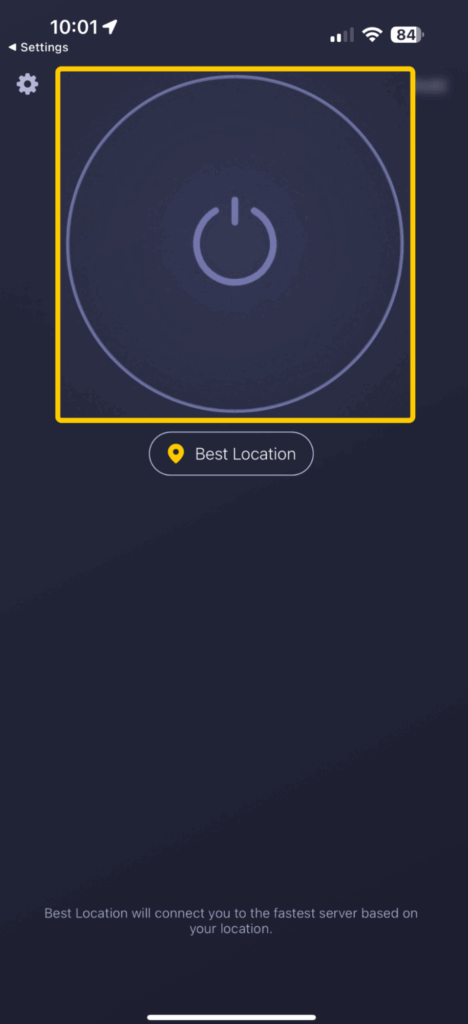
- To change servers, disconnect from the current location, then tap Best Location to choose a different country. You can see the available locations under the All tab.
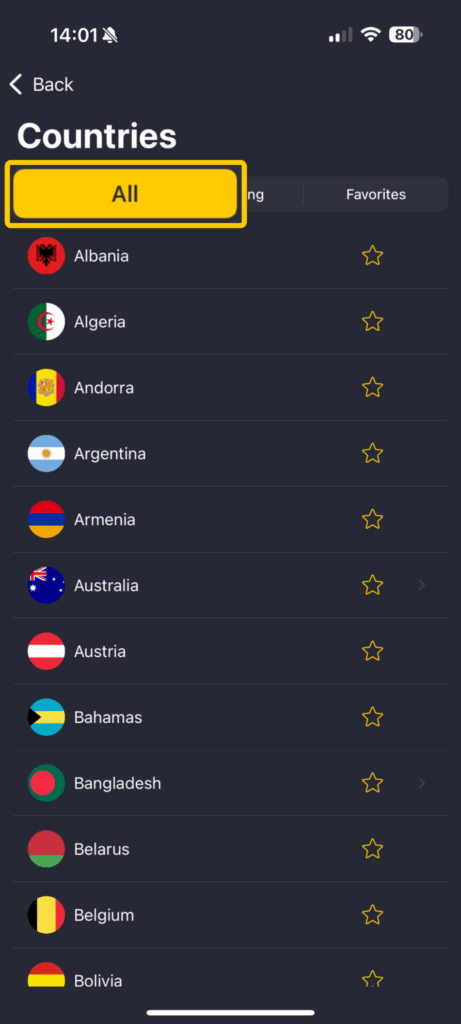
- After you select a server, the app will reconnect and show the updated server location and IP address on the main screen.
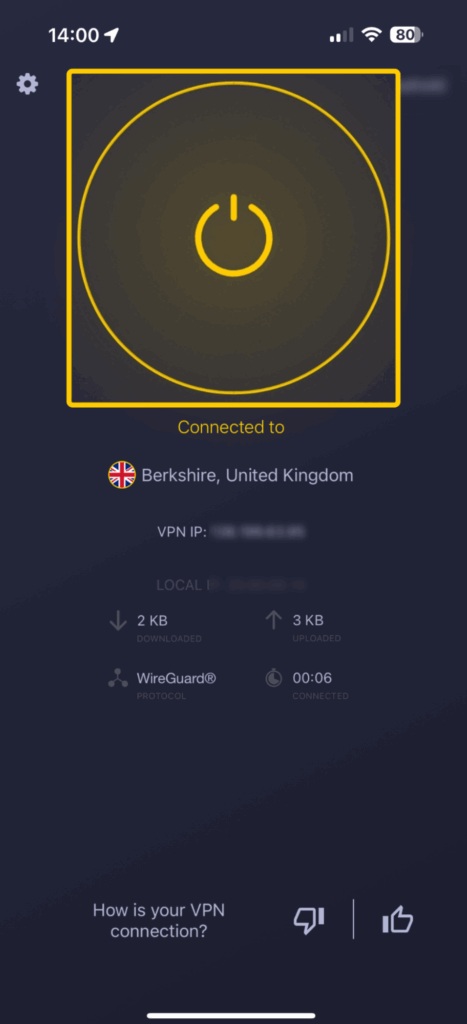
How to Manually Set Up a VPN on Mobile
You can also set up a VPN on mobile manually. It’s more technical than using an app, but you can do it directly through your device’s settings.
Android
- Open the Settings app.
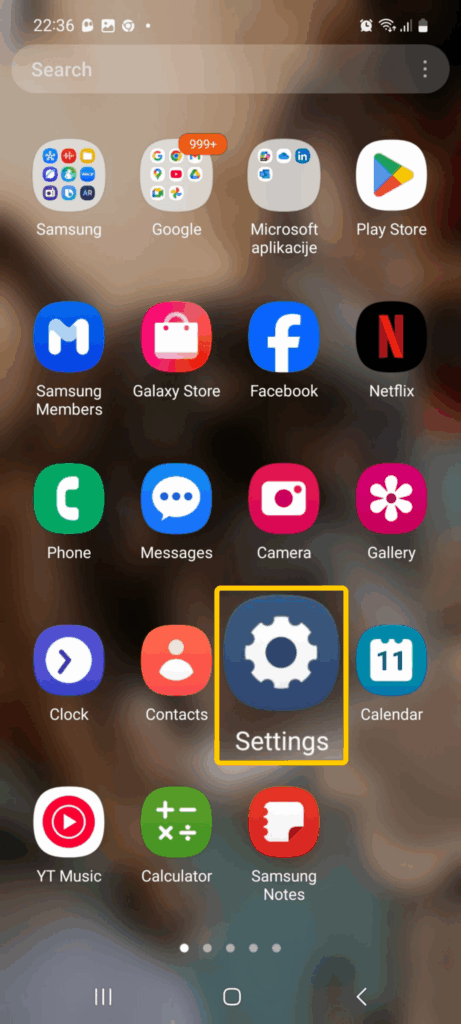
- Tap Network & Internet or Connections (the name may vary by device model and operating system).
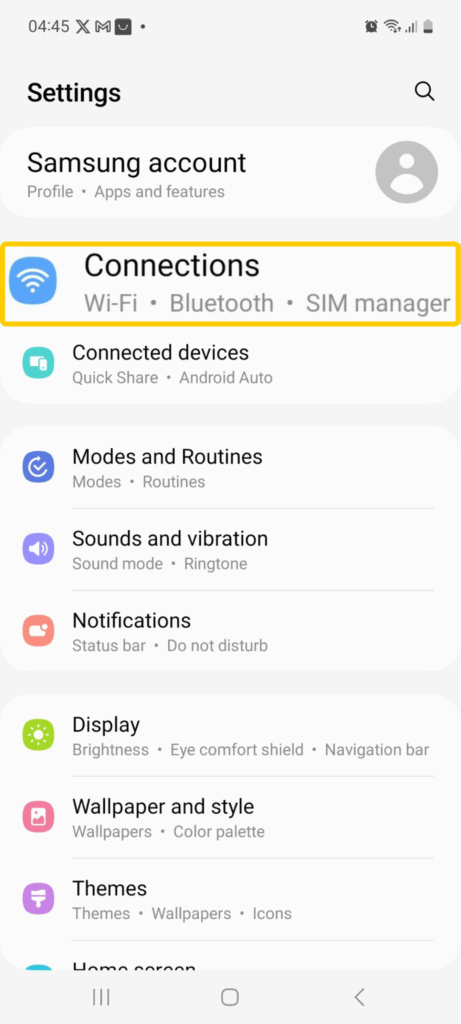
- Choose More connection settings.
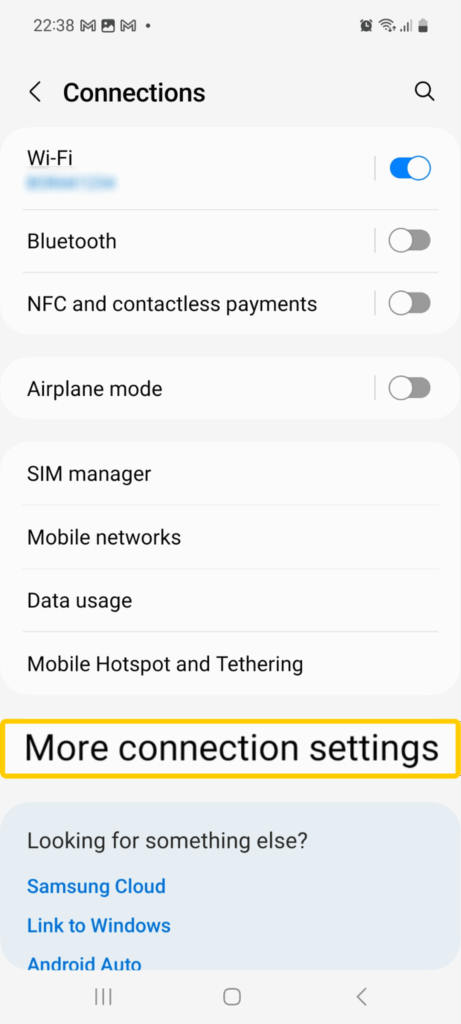
- Select VPN.
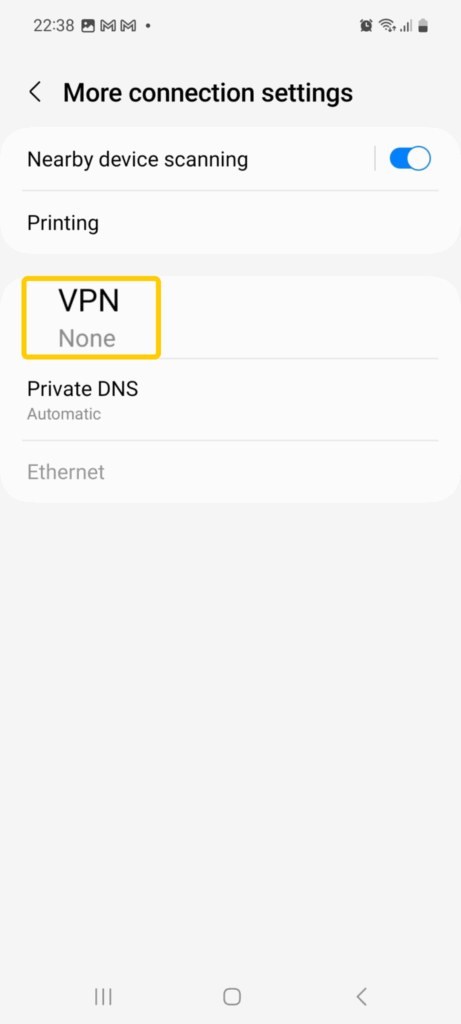
- Tap the three dots in the top-right corner, then select Add VPN profile.
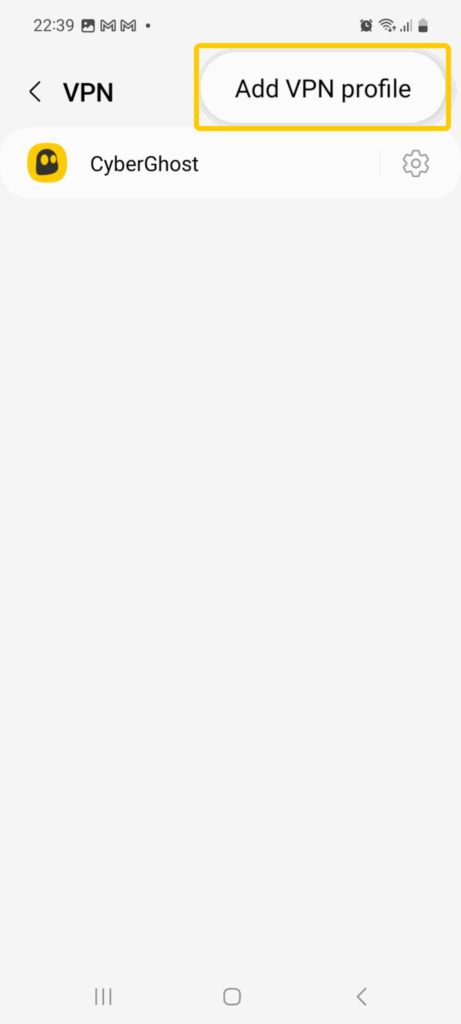
- Enter a name for the VPN.
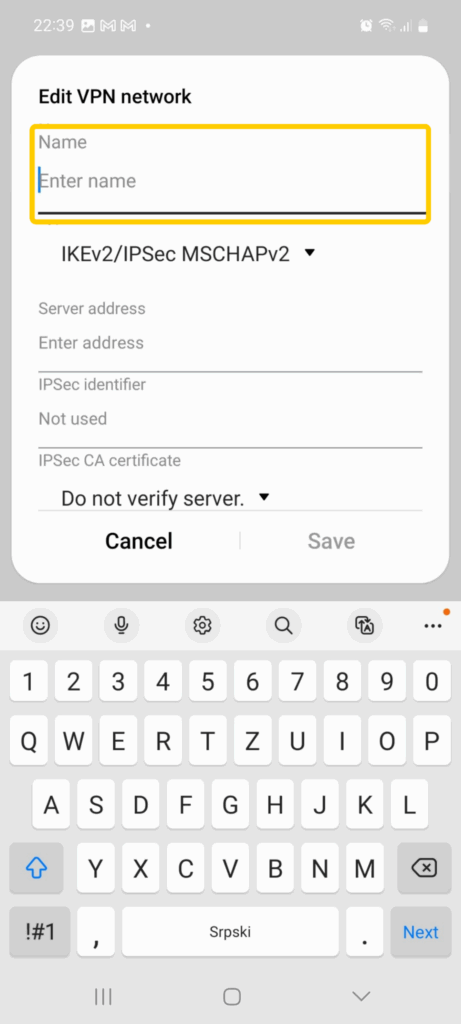
- Choose a VPN type (IKEv2/IPSec MSCHAPv2, IKEv2/IPSec PSK, or IKEv2/IPSec RSA, depending on what your provider supports). Most personal VPNs use IKEv2/IPSec MSCHAPv2, which verifies your connection with your VPN account username and password.
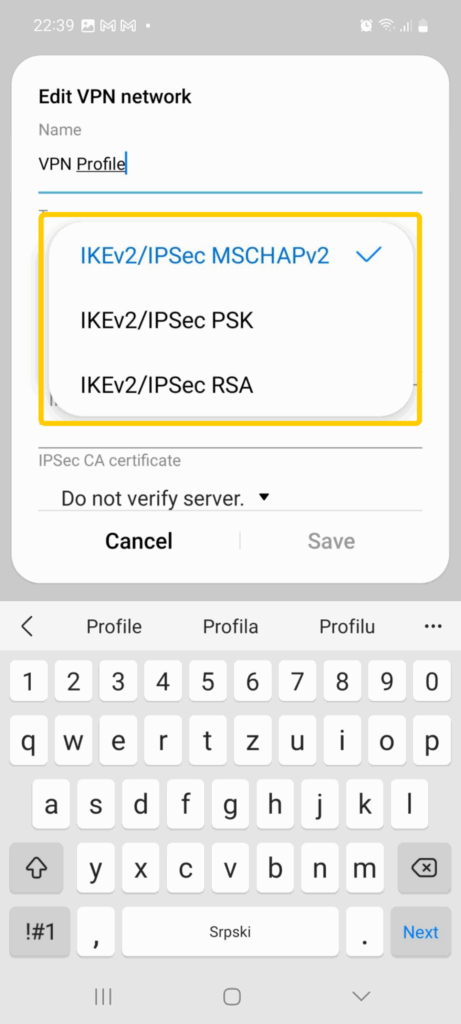
- Enter the server address and any additional details, such as a pre-shared key or IPSec identifier. For CyberGhost VPN, you can find the server address and manual setup login details in your account dashboard (Manage Devices > Manual setup > Configure Device).
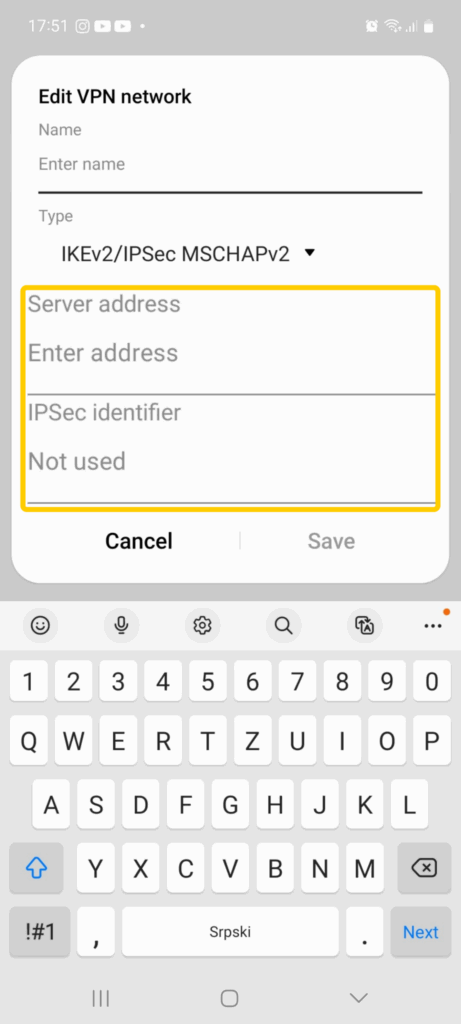
- For the IPSec CA certificate field (if shown), leave the option set to Do not verify server unless your VPN provider specifically gives you a certificate to install. Then, tap Save.
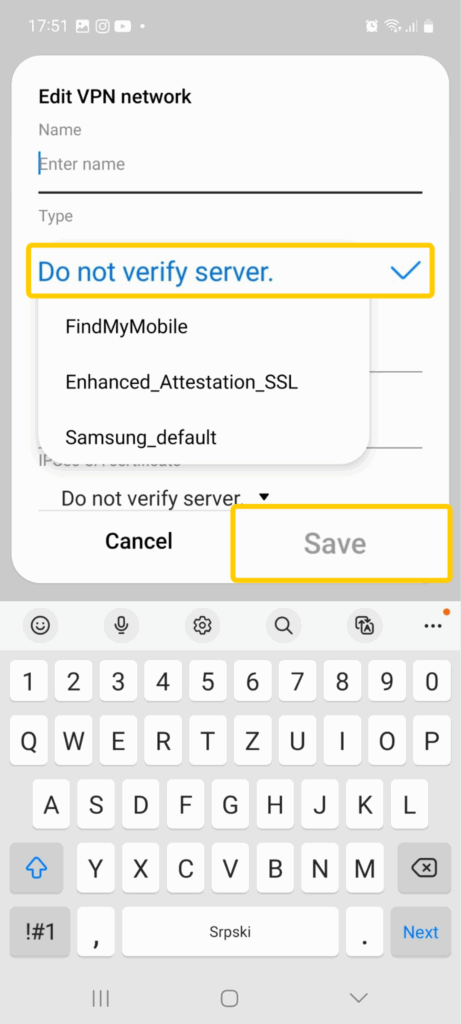
- Select the VPN profile you created, then enter your username and password to connect.
iOS
- Open Settings and go to General.
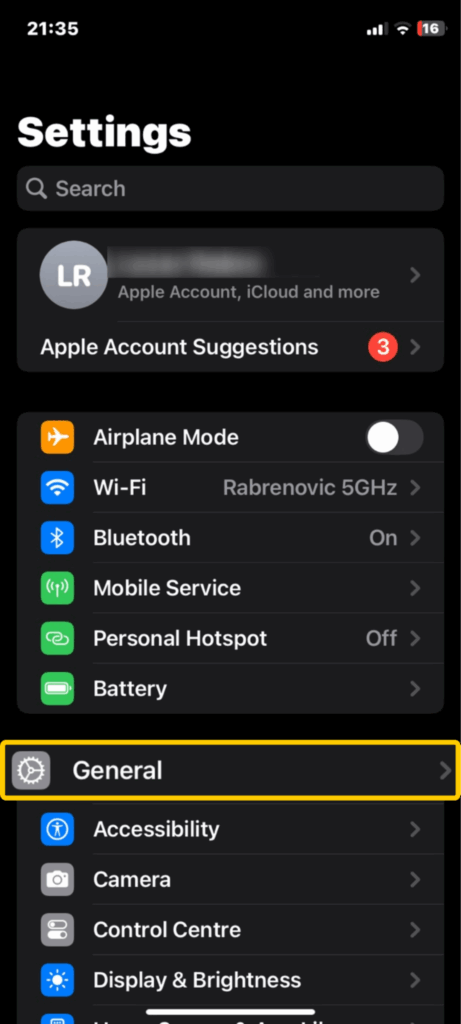
- Tap VPN & Device Management, then select VPN.
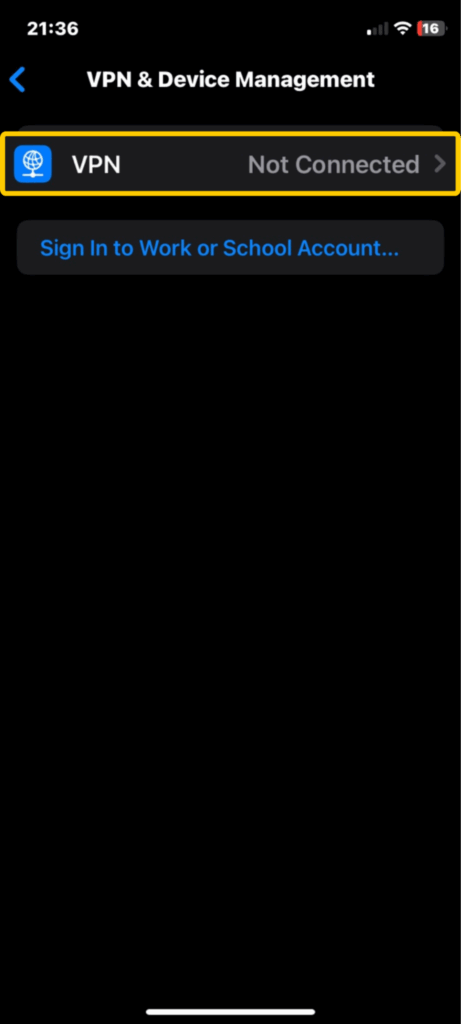
- Choose Add VPN Configuration.
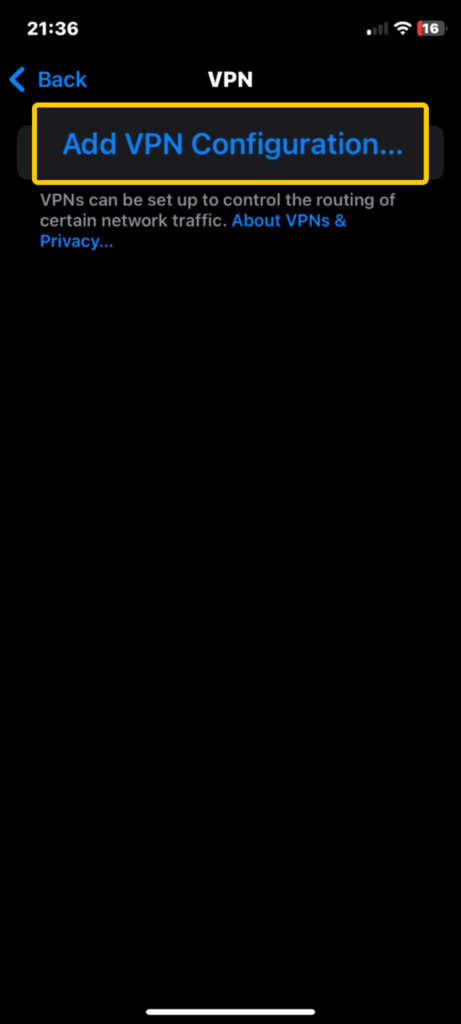
- Under Type, select IKEv2, IPSec, or L2TP, depending on what your VPN provider supports.
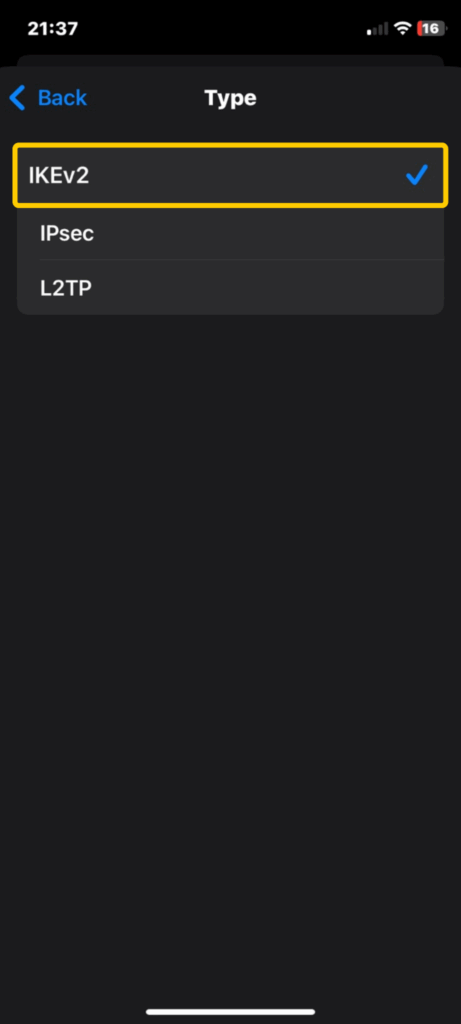
- Enter your VPN provider’s details, like the server address, remote ID, and authentication credentials (username and password).
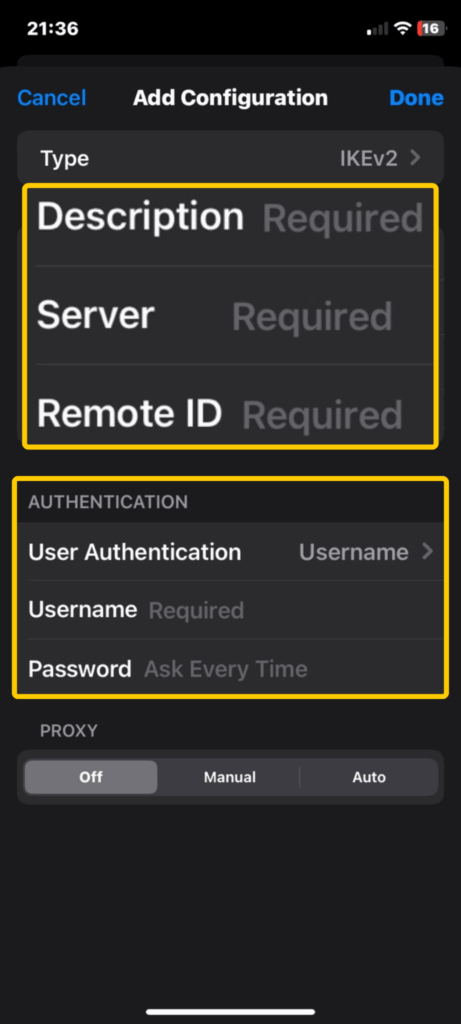
- Tap Done to save the configuration.
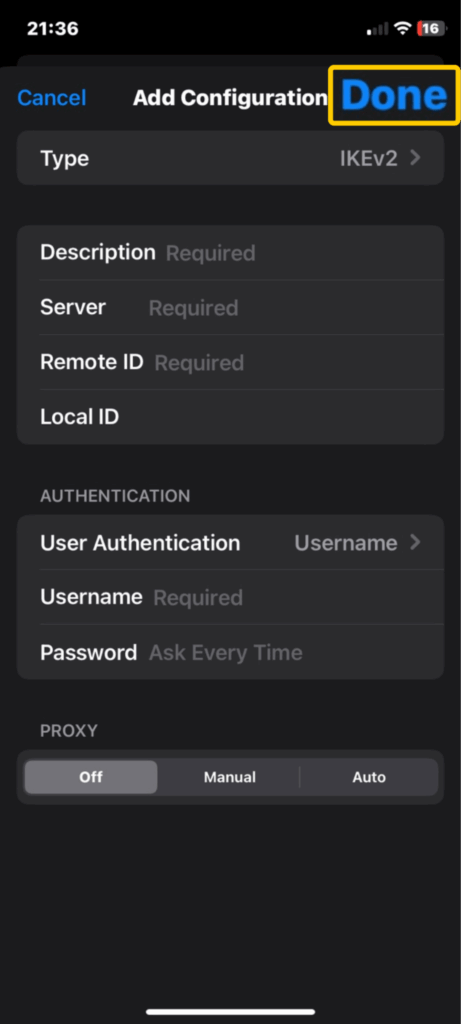
- Return to the VPN screen and toggle the switch to connect to your new VPN profile.
How to Use a VPN on a Mobile Hotspot
When you use a VPN and turn your phone into a hotspot, the VPN only protects the traffic on the phone itself. The hotspot traffic from connected devices still passes through your raw mobile data connection, not the VPN tunnel. Mobile data is generally safer than public Wi-Fi because it encrypts traffic between your device and the cell tower, so nearby attackers can’t easily intercept it.
However, your mobile carrier can still log your activity, throttle speeds, and share data for advertising or government requests. Apps and websites can also continue tracking your location through your IP address. To secure devices connected to your hotspot, you have a few options:
-
- Install the VPN app on each device so that browsing, apps, messages, and other services stay encrypted.
- Use a VPN-enabled router or hotspot device to automatically extend the VPN tunnel to all connected devices.
- Take advantage of multi-device support to protect several devices at once. CyberGhost VPN allows up to 7 simultaneous connections, so you can run the VPN on your phone, laptop, and tablet without relying on hotspot forwarding.
- Avoid advanced workarounds like rooting an Android device. This may force hotspot traffic through a VPN, but it may void your warranty and cause device instability.
Do Android and iPhone Have Built-In VPNs?
Android and iPhone don’t come with a full VPN service built in, but both provide limited alternatives. Apple offers a privacy feature called iCloud Private Relay, available on iPhone, iPad, and Mac. It encrypts Safari traffic and routes it through two internet relays to hide your IP address from ISPs and websites. However, it only works in Safari and doesn’t cover other apps or services. For full protection across your device, you still need a dedicated VPN app.
On Android, Pixel 7 and later and the Pixel Tablet include an optimized built-in VPN by Google at no extra cost in supported regions. Unlike a full VPN app, it isn’t as flexible or widely available, so most Android users rely on third-party apps for complete protection.
How to Fix Common VPN Connection Issues on Mobile
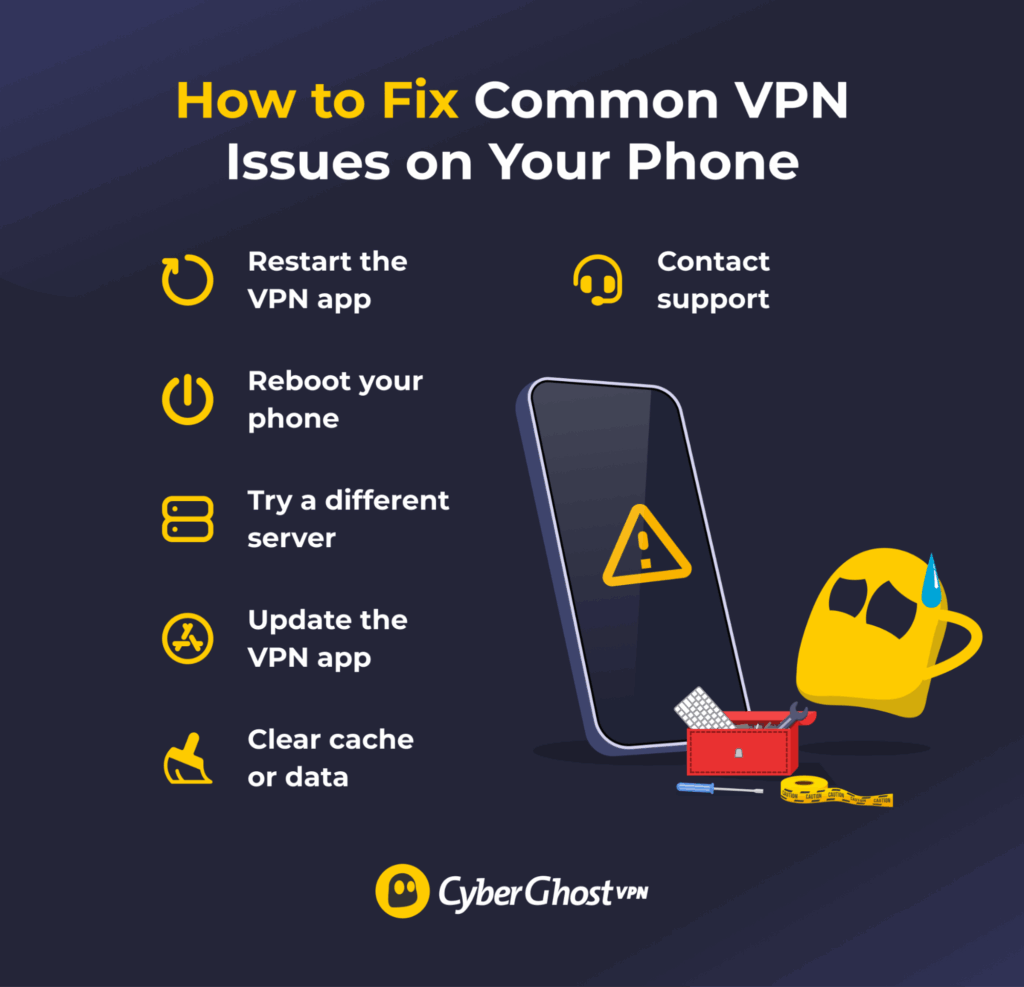
If your VPN won’t load or work properly on your phone, try these fixes:
-
- Restart the VPN app: Closing and reopening the app can clear out temporary glitches and refresh your connection. This is often the quickest fix when the VPN suddenly stops working.
- Reboot your phone: Restarting your device resets background processes that might interfere with the VPN. It also helps clear memory and network conflicts.
- Switch servers: Choosing a different server can solve issues when the current one is overloaded, blocked by a website, or temporarily down.
- Update the VPN app: Installing the latest version ensures you get bug fixes, speed improvements, and compatibility with recent Android or iOS updates.
- Clear app cache or data: Removing cached files in your phone’s settings can resolve corruption issues and give the app a clean slate.
- Contact customer support: Reaching out to your VPN provider can help with advanced troubleshooting or confirm if there’s a wider outage.
Why Use a VPN on Mobile?
A VPN keeps your mobile devices secure and private by encrypting your traffic and masking your IP address. Here’s why that matters when you’re online.
Protect Your Online Identity
Every time you connect, your IP address reveals details about your location and activity. A VPN hides your real IP with one from its server, so websites and ISPs can’t tie your browsing directly to you. That makes it harder for third parties to track your habits or build a profile about you.
Stay Connected on Restricted Networks
When you travel or use restricted networks, some of your favorite sites or apps might not work as expected. A VPN routes your traffic through a server in your home country, keeping services like news, messaging, or social media accessible. It can also reduce interruptions when switching between different networks, such as hotel Wi-Fi, airport hotspots, or mobile data.
Protect Your Data on Wi-Fi Networks
Public Wi-Fi usually lacks proper security, which could make it easier for others on the same network to intercept your traffic. A VPN creates an encrypted tunnel that keeps your passwords, messages, and personal details safe from prying eyes. It also prevents internet providers from monitoring your activity, giving you more privacy on shared hotspots.
How to Choose the Best Mobile VPN
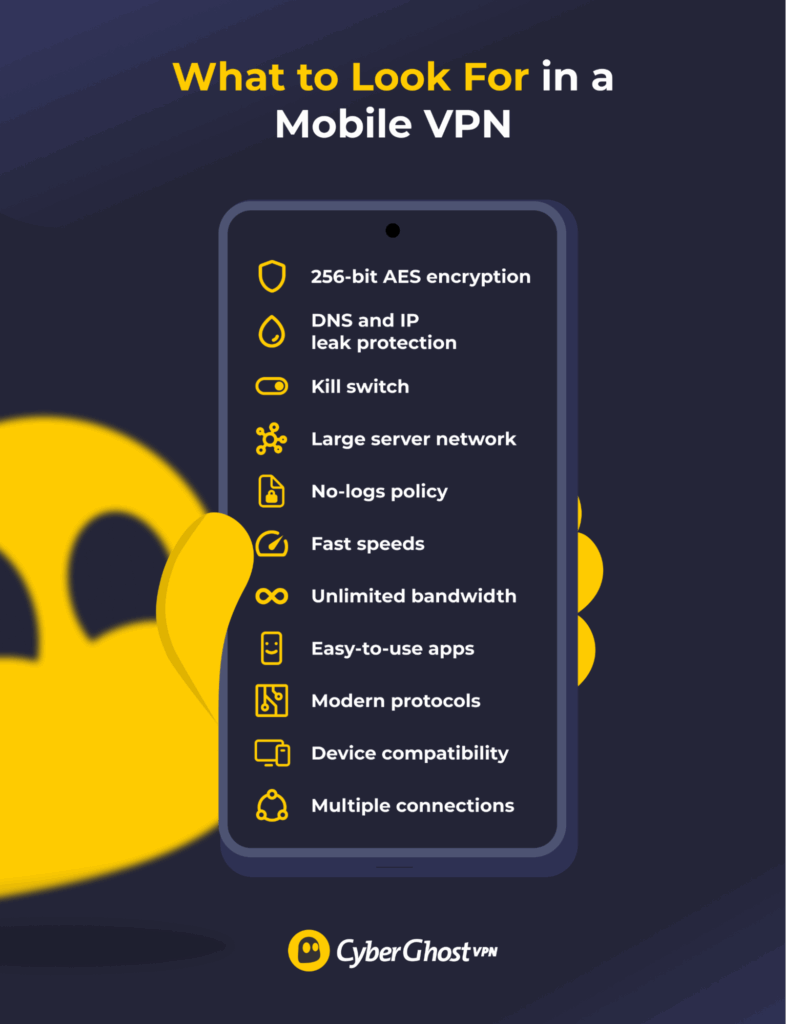
With so many mobile VPN apps available, choosing the right one can be overwhelming. The best way to narrow it down is to check for features that make a VPN secure and easy to use. Check specifically for:
-
- 256-bit AES encryption: Scrambles your data so thoroughly it’s considered to be almost unbreakable by today’s standards.
- Leak protection: Prevents your real IP address or DNS requests from leaking, keeping your identity hidden.
- Kill switch: Blocks internet traffic if the VPN drops and keeps you offline until the connection is restored, so your data isn’t exposed by accident.
- No-logs policy: Ensures the VPN provider doesn’t track or store your browsing activity.
- Modern protocols: Uses WireGuard®, OpenVPN, and IKEv2 for fast connections, reliable security, and better battery life on mobile devices.
- Large server network: Offers nearby connections for faster speeds and smoother performance on mobile data or when switching networks.
- Fast speeds: Delivers smooth browsing, streaming, gaming, and downloads without lag or slowdowns.
- Unlimited bandwidth: Doesn’t cap your data so you can browse, stream, and download as much as you want.
- Device compatibility: Supports native VPN connections on Android, iOS, and more.
- Multi-device support: Works on your phone, tablet, and other gadgets at the same time under one account.
- Easy-to-use apps: Come with a simple, intuitive interface so you can connect quickly anywhere.
Keep Your Mobile Devices Protected with CyberGhost VPN
When you’re online, you need a VPN that works as smoothly on your phone as it does on your laptop and other devices. That means strong encryption, fast speeds, and an app that connects in seconds, so you can safely browse, stream, and more wherever you go.
CyberGhost VPN’s mobile apps for Android and iOS come with 256-bit AES encryption, a built-in kill switch, DNS and IP leak protection, and access to thousands of servers worldwide. You can connect up to 7 devices at once under one account, keeping your phone, tablet, and laptop protected together. And with our 45-day money-back guarantee, you can try CyberGhost risk-free and see the difference for yourself.
FAQ
What is a VPN, and why should I use it on my mobile device?
A VPN, or virtual private network, is a privacy tool that encrypts your internet traffic and routes it through a secure server. It also changes your IP address, which limits what websites and apps can learn about your location or identity. On mobile devices, a VPN protects your data on public Wi-Fi, reduces tracking, and prevents apps and sites from linking your activity back to you.
How do I install a VPN on my Android phone?
To install a VPN on Android, go to the Google Play Store and download the CyberGhost VPN app. Open it and tap Agree & continue to accept the privacy policy. Then subscribe if you’re new or tap Existing user? to log in. Once you’re signed in, tap the large power button on the main screen to connect. Your internet traffic is then encrypted and routed through the selected server. Manual setup is also possible through system settings, but using an app is faster and easier for most people.
How can I set up a VPN on an iPhone?
To set up a VPN on iPhone, download the CyberGhost VPN app from the App Store and open it. Select Agree & continue to accept the privacy policy, then either subscribe or log in with your account. When the app asks to add a VPN configuration, choose Allow. Press the power button to connect, and a VPN icon will appear in the status bar once the VPN is running.
Do I need a paid subscription to use a VPN on mobile?
You don’t necessarily need a paid subscription, since some VPNs offer free versions. However, free VPNs usually come with restrictions like data caps, fewer servers, slower speeds, or weaker privacy practices. Paid subscriptions often give you faster, more reliable connections and stronger overall protection, which is especially important when you’re on public Wi-Fi or mobile data. CyberGhost VPN includes 256-bit AES encryption, a no-logs policy, an intuitive mobile app, and a 45-day money-back guarantee so you can try it risk-free.
Can I use the same VPN account on multiple devices?
You can often use the same VPN account on multiple devices, but it depends on the provider. Free VPNs typically restrict this, while many paid VPNs allow simultaneous connections. CyberGhost VPN lets you connect up to 7 devices at once with a single subscription. This means you can keep the VPN running on your phone, tablet, laptop, and other gadgets at the same time without needing to log out or disconnect.
Will a VPN slow down my mobile internet connection?
A VPN may slow your mobile internet slightly because encrypting traffic and routing it through a remote server can add overhead. CyberGhost VPN is designed to minimize this with a large server network and modern protocols that keep connections fast and reliable. In most cases, any change in speed isn’t noticeable, so you can browse, stream, and use apps on your phone without interruptions.
Is it safe to use free VPN apps on mobile?
Free VPNs often come with trade-offs. Some may log your activity, show ads, or even share your data with third parties. While not every free service is dangerous, most aren’t built for long-term protection. For consistent privacy on mobile, it’s safer to choose a trusted paid VPN with strong encryption and a strict no-logs policy.
Can I choose which country my mobile VPN connects to?
Yes, most VPNs let you choose a specific country or city to connect to. To do so, you need to open a server list in your mobile VPN app and tap on the location you’d like to use. Alternatively, many VPNs can find the fastest connection for you automatically, so you don’t have to worry about noticeable speed drops.
How do I know if my mobile VPN is working?
Most VPN apps show a large power button that lights up when you’re connected. CyberGhost VPN displays your network status, server location, IP address, and protocol in the app. You can also run a quick “What’s my IP” search in your browser. If the result shows a different IP address than usual, your VPN is working.
Does a VPN protect me when using public Wi-Fi on mobile?
Yes. A VPN encrypts your data, even on public Wi-Fi. This helps prevent others on the same network from intercepting your traffic and lowers the risk of someone viewing your activity or stealing confidential information.
How much does a VPN for your phone cost?
Prices for mobile VPNs vary depending on the provider and subscription length. In general, longer subscriptions come with lower monthly rates than short-term plans, and many providers offer flexible options to fit different budgets. CyberGhost VPN has multiple subscription tiers and includes a 45-day money-back guarantee on long-term plans, so you can try it with confidence.
Should I leave my VPN on all the time on my phone?
You don’t always need to leave your VPN on, but it’s usually a good idea. Leaving it active ensures your traffic stays encrypted as you move between different networks, like mobile data, airport Wi-Fi, or hotel hotspots. This also keeps your IP address consistent, which limits how much websites and apps can track you.
However, there are a few downsides. A VPN can use extra battery power because it runs in the background, and some people prefer turning it off on trusted home Wi-Fi to save energy. Still, if you want ongoing protection from tracking, data collection, and online risks, having your VPN on all the time is the safer choice.
Can I use a free VPN on mobile?
Yes, you can use a free VPN on mobile, but these services tend to be best for short-term use or light browsing. Some free VPNs impose data limits, show ads, or restrict your server access, which may make your connection slower and less reliable. They might also lack advanced privacy tools and customer support. Paid VPNs, on the other hand, offer larger server networks, stronger security features, and steady connections. With strict no-logs policies and dedicated support, they’re a more dependable choice for everyday protection.


Leave a comment